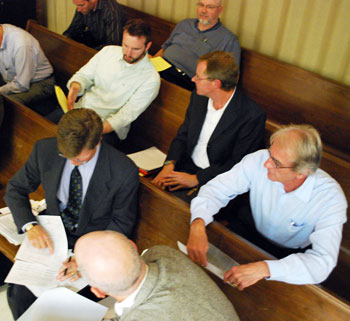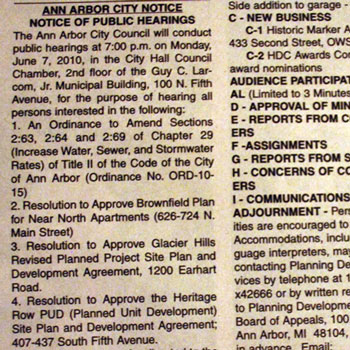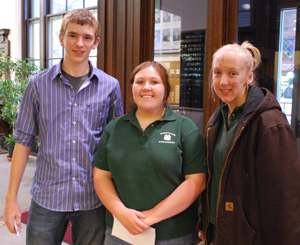Ann Arbor City Council Sunday night caucus (Oct. 18, 2009): At its Sunday night caucus, Ann Arbor city council members heard from only a couple of residents who actually spoke in favor of keeping Argo Dam in place.

Piezometer installed in mid-September along the earthen berm separating the Argo Dam headrace from the river. (Photo by the writer)
But those speakers were supported by the presence of almost two dozen others who attended the regular Sunday evening affair, to make clear that they also supported a resolution on the dam – which was added to Monday’s Oct. 19 agenda on Friday, Oct. 16.
Monday’s resolution, which is sponsored by Stephen Rapundalo (Ward 2), Marcia Higgins (Ward 4), and Sandi Smith (Ward 1), expresses the intent of city council to keep the dam in place. [Text of the resolution]
At caucus, one of the voices of dissent on the resolution belonged to Laura Rubin, executive director of the Huron River Watershed Council. She told the three councilmembers present – Stephen Rapundalo (Ward 2), Sabra Briere (Ward 1), and Mike Anglin (Ward 5) – that there’d been an expectation that the city council would follow the example of the city’s Park Advisory Commission and the Environmental Commission by holding a formal public hearing on the vote.
The resolution on Monday’s agenda does not include a public hearing.
After the caucus concluded, Rubin told The Chronicle that the expectation of a city council public hearing was based on a hearing that had been planned for July 6, 2009, but that was canceled when the council decided to ask the Michigan Department of Environmental Quality for more time to decide. We had a look at The Chronicle archives to verify that contention.
Other caucus topics addressed by residents included a crosswalk to be installed at the intersection of Waldenwood and Penberton drives and a request for an update on the East Stadium bridges. Council will consider a resolution on Monday to follow the advice of an outside engineering consultant to proceed with removal of bridge beams supporting the southern lanes, which are currently closed to traffic. [Full Story]







